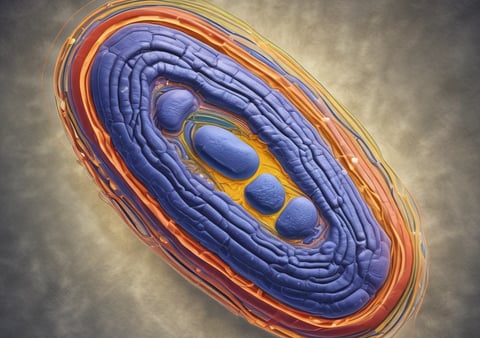
Unlock Your Fat-Burning Potential: The Power of Mitochondria and How to Boost Them for Weight Loss
Are you struggling to shed those extra pounds no matter how hard you work out or watch what you eat? It might be time to shift your focus to a key player in your body’s fat-burning process: the mitochondria.
Mitochondria are tiny powerhouses inside your cells that play a vital role in converting the food you eat into energy, which can then be used for various bodily functions, including burning fat. If you’ve ever heard the term "cellular powerhouse," that’s mitochondria doing their thing! Optimizing the function of your mitochondria can make a significant difference in your weight loss journey.
In this guide, we'll explore the science behind mitochondria, how they influence fat loss, and what you can do to improve their function through diet, exercise, and supplementation. Let’s dive in!
-Table of Contents-
1. What Are Mitochondria and How Do They Work?
2. Mitochondria’s Role in Fat Burning
3. Why Healthy Mitochondria Are Essential for Weight Loss
4. How to Improve Mitochondrial Function Naturally
- Diet Changes for Mitochondria Health
- Exercise Tips for Boosting Mitochondrial Efficiency
- Supplements That Help Support Mitochondrial Activity
5. Conclusion: Take Charge of Your Fat-Burning Potential!
---
1. What Are Mitochondria and How Do They Work?
Mitochondria are tiny, but mighty, organelles found in nearly every cell in your body. They’re often referred to as the "powerhouses" of your cells because they produce energy in the form of ATP (adenosine triphosphate), which powers all of your bodily functions. ATP is essential for processes like muscle contractions, digestion, and, yes, burning fat.
The mitochondria break down nutrients from food—primarily fats, carbohydrates, and proteins—and convert them into usable energy. When your mitochondria are working efficiently, you can burn fat more effectively, giving you a better chance of losing weight.
But if your mitochondria aren’t functioning optimally, your metabolism can slow down, making it harder to burn fat and maintain energy levels throughout the day.
2. Mitochondria’s Role in Fat Burning
Mitochondria are directly involved in the process of fat oxidation, which is the process your body uses to burn fat for energy. When you eat food, the carbohydrates and fats are digested and transported to your cells. Once inside, the mitochondria break these nutrients down to release energy.
Here’s a simple breakdown of how mitochondria support fat burning:
- Fat is broken down: In the process of fat oxidation, fats are converted into fatty acids, which then enter the mitochondria.
- Energy is produced: Inside the mitochondria, fatty acids are metabolized to create ATP, the energy your body needs to function.
- Fat is burned: The more efficiently your mitochondria work, the better they are at converting stored fat into usable energy.
When you improve mitochondrial function, you essentially make it easier for your body to tap into fat stores and burn them for fuel. This can help accelerate weight loss, especially when combined with a healthy diet and regular exercise.
---
3. Why Healthy Mitochondria Are Essential for Weight Loss
When mitochondria are sluggish or inefficient, your body struggles to burn fat. This can lead to several issues that may slow down your weight loss efforts:
- Slow metabolism: If your mitochondria aren’t working efficiently, your metabolism can slow down, making it harder to burn calories and fat.
- Fat storage: Inefficient mitochondria may not be able to break down fat as effectively, leading to the storage of excess fat.
- Low energy: When mitochondria aren’t producing enough ATP, you may feel fatigued, which can reduce your exercise performance and make it harder to stay active.
By taking steps to improve mitochondrial health, you can boost your metabolism, enhance fat burning, and feel more energized throughout the day.
---
4. How to Improve Mitochondrial Function Naturally
There are several ways to improve the function of your mitochondria. These methods combine dietary changes, exercise, and supplementation to support mitochondrial efficiency and increase fat-burning potential.
-Diet Changes for Mitochondria Health-
What you eat plays a crucial role in the health of your mitochondria. A well-balanced diet with the right nutrients can support mitochondrial function and boost fat burning.
Here are some key dietary tips to support mitochondrial health:
1. Increase Healthy Fats: Healthy fats, especially from sources like avocado, olive oil, and nuts, provide the mitochondria with the building blocks they need to function. Omega-3 fatty acids, found in fish like salmon, also help improve mitochondrial efficiency.
2. Incorporate Antioxidants: Mitochondria are susceptible to oxidative stress, which can damage their function. Eating antioxidant-rich foods, such as berries, leafy greens, and dark chocolate, can help protect your mitochondria from damage.
3. Eat More Protein: Protein is essential for muscle repair and growth. It also supports mitochondrial biogenesis (the creation of new mitochondria), which can help improve fat-burning capabilities.
4. Limit Sugar: Excess sugar can overload your mitochondria and reduce their efficiency. Try to cut back on processed sugars and opt for whole foods instead.
5. Stay Hydrated: Mitochondria require water to function properly. Make sure you’re drinking enough fluids throughout the day to keep everything running smoothly.
-Exercise Tips for Boosting Mitochondrial Efficiency-
Regular exercise is one of the most effective ways to increase mitochondrial function. Here are some exercise strategies that can help:
1. High-Intensity Interval Training (HIIT): HIIT workouts have been shown to stimulate mitochondrial biogenesis, making them a great way to boost fat burning and energy levels.
2. Endurance Training: Long, steady-state cardio (like jogging or cycling) can also help improve mitochondrial function, as it increases the number and efficiency of mitochondria in your muscles.
3. Strength Training: Lifting weights or doing bodyweight exercises can help stimulate the growth of mitochondria in muscle cells, leading to improved fat-burning capabilities.
4. Active Recovery: Incorporating light activities, such as walking or yoga, can promote mitochondrial health without overtaxing your body.
-Supplements That Help Support Mitochondrial Activity-
Certain supplements can help support mitochondrial function and enhance fat burning. Here are some of the most popular and effective options:
1. Coenzyme Q10 (CoQ10): CoQ10 is a powerful antioxidant that plays a key role in energy production within mitochondria. Supplementing with CoQ10 can help improve mitochondrial efficiency and support fat burning.
2. L-Carnitine: L-carnitine helps transport fatty acids into mitochondria, where they can be burned for energy. This supplement can support fat metabolism and help with weight loss.
3. Alpha-Lipoic Acid (ALA): ALA is another potent antioxidant that helps protect mitochondria from oxidative stress. It also plays a role in energy production and fat metabolism.
4. Magnesium: Magnesium is involved in over 300 enzymatic reactions in the body, including those that support mitochondrial function. Supplementing with magnesium can help improve your overall energy levels.
5. B Vitamins: B vitamins, especially B1 (thiamine), B2 (riboflavin), and B3 (niacin), are essential for mitochondrial energy production. A B-complex supplement can help ensure you’re getting the right amounts of these vitamins.
6. Resveratrol: Found in grapes and red wine, resveratrol has been shown to improve mitochondrial function and promote fat burning.
By adding the right supplements to your routine, you can support mitochondrial function and enhance your fat-burning capabilities.
---
5. Conclusion: Take Charge of Your Fat-Burning Potential!
Your mitochondria are the unsung heroes of your fat-burning journey. By optimizing their function through a combination of diet, exercise, and supplementation, you can supercharge your metabolism, burn fat more effectively, and finally start seeing the weight loss results you’ve been working for.
Remember, the road to better mitochondrial health doesn’t happen overnight. But with consistency, you’ll be well on your way to unlocking your body’s fat-burning potential.
If you’re looking for an easy way to enhance mitochondrial function, consider incorporating supplements like CoQ10, L-carnitine, and alpha-lipoic acid into your routine. And don’t forget that a healthy diet and regular exercise are key to maximizing the benefits.
So, what are you waiting for? Give your mitochondria the support they need to help you burn fat and feel great!
---
Disclaimer: Before starting any new supplement regimen, it’s always a good idea to consult with a healthcare provider, especially if you have pre-existing conditions or are taking other medications.
We may receive affiliate commissions on products purchased from links included on this page.







